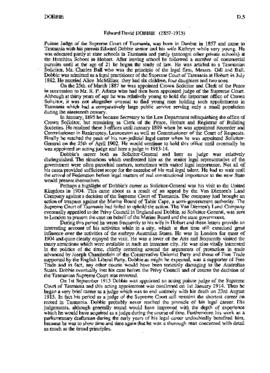Identity area
Reference code
Title
Date(s)
- 1904 (Creation)
Level of description
Collection
Extent and medium
1 folder
Context area
Name of creator
Biographical history
Puisne Judge of the Supreme Court of Tasmania, was born in Dunbar in 1857 and came to Tasmania with his parents Edward Dobbie senior and his wife Kathryn while very young. He was educated partly at state schools in Tasmania and partly (amongst other private schools) at the Hutchins School in Hobart. After leaving school he followed a number of commercial pursuits until at the age of 21 he began the study of law. He was articled to a Tasmanian Solicitor, Mr. Charles Ball who was the principle of the legal firm, Messrs. Gill and Ball. Dobbie was admitted as a legal practitioner of the Supreme Court of Tasmania at Hobart in July 1882. He married Alice McMillan; they had six children, four daughters and two sons.
On the 25th of March 1887 he was appointed Crown Solicitor and Clerk of the Peace in succession to Mr. R. P. Adams who had then been appointed judge of the Supreme Court. Although at thirty years of age he was relatively young to hold the important office of Crown Solicitor, it was not altogether unusual to find young men holding such appointments in Tasmania which had a comparatively large public service serving only a small population during the nineteenth century.
In January, 1895 he became Secretary to the Law Department relinquishing the office of Crown Solicitor, but remaining as Clerk of the Peace, Hobart and Registrar of Building Societies. He retained these 3 offices until January 1899 when he was appointed Recorder and Commissioner in Bankruptcy, Launceston as well as Commissioner of the Court of Requests. Finally he reached the peak of his non-judicial legal career when he was appointed Solicitor General on the 25th of April 1902. He would continue to hold this office until eventually he was appointed an acting judge and later a judge in 1913-14.
Dobbie's career both as Solicitor-General and later as judge was relatively distinguished. The situations which confronted him as the senior legal representative of the government were often parochial matters, sometimes with varied legal importance. Not all of his cases provided sufficient scope for the exercise of his real legal talent. He had to wait until the arrival of federation before legal matters of real constitutional importance to the new State would present themselves.
Perhaps a highlight of Dobbie's career as Solicitor-General was his visit to the United Kingdom in 1904. This came about as a result of an appeal by the Van Diemen's Land Company against a decision of the Supreme Court of Tasmania. The company had brought an action of trespass against the Marine Board of Table Cape, a semi-government authority. The Supreme Court of Tasmania had failed to uphold the action. The Van Diemen's Land Company eventually appealed to the Privy Council in England and Dobbie, as Solicitor-General, was sent to London to present the case on behalf of the Marine Board and the state government.
During this period he wrote frequently to his wife in Hobart and these letters provide an interesting account of his activities while in a city, which at that time still exercised great influence over the activities of the embryo Australian States. He was in London for most of 1904 and quite clearly enjoyed the visit. He was a lover of the Arts and frequently visited the many attractions which were available in such an immense city. He was also vitally interested in the politics of the time, chiefly centring around the arguments of protection in trade advanced by Joseph Chamberlain of the Conservative Unionist Party and those of Free Trade supported by the English Liberal Party. Dobbie as might be expected, was a supporter of Free Trade and in fact, any other course would have been seriously damaging to the Australian States. Dobbie eventually lost his case before the Privy Council and of course the decision of the Tasmanian Supreme Court was reversed.
On 1st September 1913 Dobbie was appointed an acting puisne judge of the Supreme Court of Tasmania and this acting appointment was confirmed on 1st January 1914. Thus he began a very brief career as a judge which was to end untimely with his death on 23rd August 1915. In fact his period as a judge of the Supreme Court still remains the shortest career on record in Tasmania. Dobbie probably never reached the pinnacle of his legal career. His judgements, although generally sound would have improved with the depth of experience which he would have acquired as a judge during the course of time. Furthermore his work as a parliamentary draftsman during the early years of his legal career undoubtedly benefited him, because he was to show time and time again that he was a thorough man concerned with detail as much as the broad principles.
Immediate source of acquisition or transfer
Content and structure area
Scope and content
Folder of photocopied typewritten material, 221 pages, typed
Appraisal, destruction and scheduling
Accruals
System of arrangement
Conditions of access and use area
Conditions governing access
Conditions governing reproduction
This material is made available for personal research and study purposes under the University of Tasmania Standard Copyright Licence. For any further use permission should be obtained from the copyright owners. For assistance please contact Special.Collections@utas.edu.au When reusing this material, please cite the reference number and provide the following acknowledgement: “Courtesy of the UTAS Library Special & Rare Collections”
Language of material
Script of material
Language and script notes
Physical characteristics and technical requirements
Finding aids
Original inventory and descriptive notes can be found at https://eprints.utas.edu.au/10907/2/Dobbie.pdf
Existence and location of originals
Existence and location of copies
Related units of description
Alternative identifier(s)
Access points
Subject access points
Place access points
Name access points
Genre access points
Description identifier
Institution identifier
Rules and/or conventions used
Status
Level of detail
Dates of creation revision deletion
HE-Jan 2018


